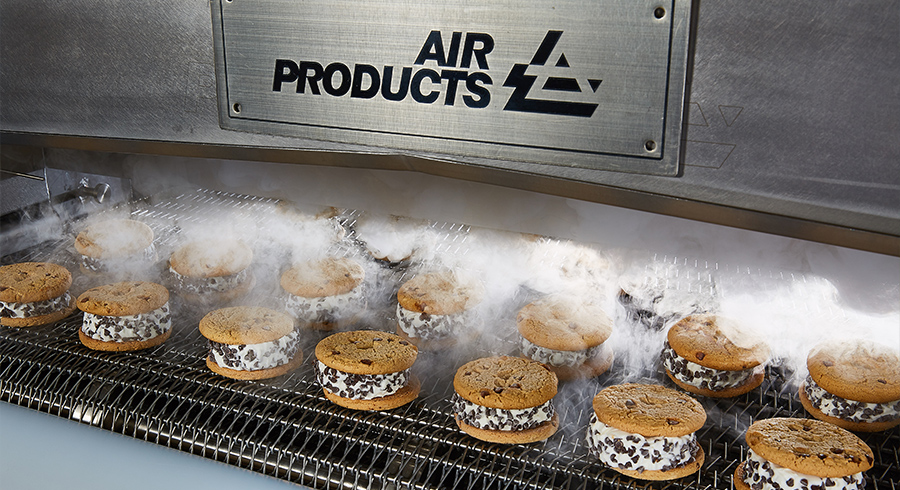Managing food waste is an ongoing challenge for UK homes and businesses. We discard approximately 9.5 million tonnes of food every year1, a figure that takes into account every stage of the food supply chain, from production to retail to consumer.
This significant amount of waste presents a big problem in respect of global CO2 emissions and how we go about reducing its impact. Food waste accounts for around 8% of annual global greenhouse gas emissions2 due to its release of harmful gases, such as methane, into the atmosphere. There’s a financial cost too – with waste putting a dent on the industry’s bottom line, as well as impacting the environment.
Fortunately, there’s a way for the food sector to reduce the impact in both of these areas and that’s through increasing our understanding of the benefits of frozen food. Frozen alternatives to our fresh favourites are changing consumers’ relationship with food - and in turn, changing the way businesses bring frozen food to market. That’s also the experience of the British Frozen Food Federation (BFFF), with its Chief Executive, Rupert Ashby adding: “Due to manufacturing efficiencies and products staying ‘fresher’ for longer in the freezer without going off, there is significantly less waste from frozen products. Not only that, freezing is nature’s pause button.
“In production, freezing ensures that food that would otherwise go off can be safely stored for long periods of time. It also plays a vital role in using ‘wonky fruit and veg’ and other products that are often rejected for sale on cosmetic grounds by retailers. Extended shelf-life ensures products such as summer berries and winter squashes are available all year round in as fresh a condition as when they were harvested.”
Ultimately, it offers a smart, sustainable and cost-effective solution that also helps protect the planet. So what solutions can it provide to the challenges we face?
Freeze more, waste less
We’re living in a world where most of us are trying to reduce waste and make better use of our resources – and if we can save money at the same time, then that’s even better. We already know that consumers buying and consuming frozen foods generate less waste. In fact, research published in the British Food Journal shows that frozen foods generate 47% less food waste in the home, compared to ambient and chilled food3. Frozen produce is also generally cheaper4, helping consumers to save money while extending the cupboard life (or freezer life) of the food they’re buying.
In addition, there’s convenience to consider. The expanding choice in the frozen food aisle provides increasing flexibility when people are meal planning. Longer shelf-life combined with lower costs means that consumers can bulk buy, without worrying the food will spoil before they get a chance to use it.
Frozen produce allows busy consumers to be flexible with their food choices. And Rupert Ashby discusses this further: “For consumers, the most common reason for food waste is that it’s left unused. Fridges are stocked with the best intentions but plans change. Frozen allows better portion control, with people only using what they need, when they need it. The rest of the pack stays fresh in the freezer, not rotting in the bin.”
These practical and cost benefits that come from the use of frozen food have not been lost on consumers. The latest figures from the British Frozen Food Federation (BFFF) show that the value and volume of frozen food sold in the UK rose by 15.6% (£1.13bn) during 20235. But this increase in the popularity of frozen food brings with it pressure on the manufacturing sector to meet demand, while still keeping its sustainability credentials in check.

Choosing the right manufacturing processes
Our work with food manufacturers, who are looking to improve and streamline their processes, is not only to ensure they can meet increasing demand, but also to help them reduce their carbon impact. There are a lot of factors to consider.
For example, manufacturers will need to look at their existing equipment and consider whether they’re using the most appropriate type of freezers to maximise the quality of their products. They need to think about the future too and identify how they can best scale-up their existing operations to meet growing demand. This brings in a wide range of deliberations, from the type of packaging used (e.g. using bigger bag sizes), to how they support their supply chain before and after the actual freezing process.
Then there’s the process technology. Cryogenic freezing is increasingly recognised as a cost-effective alternative to traditional methods of food freezing. It supports waste reduction throughout the supply chain and offers faster production times. For example, cryogenic freezing can be adjusted across a wide range of temperatures at short notice in order to adapt to changing production demands easily – allowing manufacturers to move simply and quickly from freezing one food product to another. Head over to our previous blog to find out what is best for your production line.
However, choosing the right equipment and technology will only get you some of the way towards making the most of the opportunities being presented. The final piece of the jigsaw is an ability and willingness to collect, analyse and learn from data – which is now more available to us than ever before. For example, data can be used to examine inefficiencies in resource and processes. These will often be the factors that lead to waste and associated costs. We can help harness that data to inform better business decisions through utilising our Air Products Smart Technology solutions.
And making better business decisions is a common goal. When it comes to the frozen food sector, those decisions are the ones that will often deliver a better quality product for consumers while at the same time reducing waste and cutting costs.
Evidently, tackling the issue of food waste is a big part of the pursuit of reducing environmental impact and there is a role for both consumers, manufacturers and suppliers to play. Progress in the frozen food sector is certainly the right direction of travel but there is further to go. Greater innovation and collaboration within the food industry and its suppliers, particularly within the frozen food sector, can take us that step further and will be the key to continuing to overcome the challenge of food waste, and meet demand.
1 Waste Managed
2 Energy Saving Trust
3 British Food Journal
4 The Guardian
5 British Frozen Food Federation





